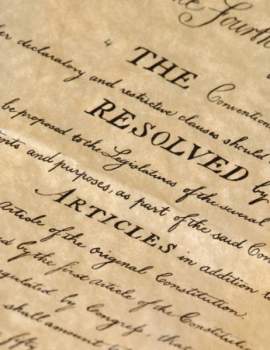
Sixth Amendment

Popular In Constitution
Purpose Of Lifetime Appointment And Pros And Cons Enumerated Powers Bicameral Legislature Background Article 3 Of The Constitution We The People 1st Amendment Who Wrote The Constitution Judicial Review Equal Protection Clause 5th Amendment 10th Amendment Three Fifths Compromise
The Sixth Amendment sets forth provisions regarding criminal prosecutions. It grants certain rights to the accused in order to ensure a fair and just trial and verdict rendering. Because under United States law an individual is "innocent until proven guilty", it is important for those facing accusations or allegations of a criminal kind to be provided with specific rights.
The Sixth Amendment provides for six distinct rights under its provisions:
1) Speedy Trial
2) Public Trial
3) Impartial Jury
4) Notice of Accusation
5) Confrontation
6) Counsel
A speedy trial is a right of a defendant in criminal court proceedings. A speedy trial is defined by certain categories in order to provide that such a right has not been violated in any way. If a trial is to be delayed, the length of delay will come into question. Though there is no set time limit imposed from the day the defendant is brought into custody or indictment occurs, if the trial delay lasts over a year, it is considered "presumptively prejudicial" and will be deemed a violation of Sixth Amendment rights, thus necessitating an acquittal.
The delay is also subject to provide for a just reason, such as the prosecution delaying trial in order to provide and secure for witnesses or evidence for their case. However, the delay must be considered reasonable and may be subject to the length of deal provision. If a defendant agrees or coincides with the decision for a delay, which is beneficial to his/her case, the defendant cannot at a later time claim a 6th Amendment rights violation. If the delay has caused any kind of prejudice that may prove to affect the court's decision, a violation may be claimed.
The defendant has the right to a public trial, but the right is not always granted in cases where a public trial can effectively affect the outcome of the court's decision. If a public trial can be proven to affect due process, such right may not be granted to the defendant. In certain instances, a closed trial may be in order at the request of either the defendant or the courts, with the court having the final decision on the matter. It must be proven that a public trial will affect the defendant's right to a fair trial and such publicity has the propensity of creating prejudice against the defendant.
An impartial jury is an important aspect considered under the 6th Amendment, for it ensures a defendant's right to a fair trial and due process. Juries must be free of bias and both sides of the litigation may question possible jurors for the case in order to determine if any prejudice or bias exists. A jury must also represent an appropriate cross-section of the community to further ensure that no bias is to be found among them.
Before a defendant is brought to trial, he/she has the right to be completely informed on the nature of the accusations, as well as all of the actions committed that have led to such allegations. The defendant must be informed of all actions allegedly committed to in a precise and accurate manner. This is also a protection under the Fifth Amendment.


















